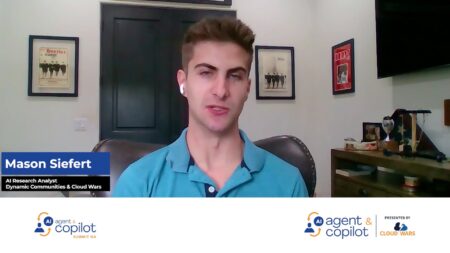
While SAP plans to invest $22 billion in its sovereign cloud for Europe and longtime partner AWS is pumping another $8.5 billion into its own European sovereign cloud, the biggest strategic asset SAP is deploying is CEO Christian Klein’s insistence that European companies focus on AI-powered innovation and growth rather than trying build their own imitation hyperscalers.
I realize that $30 billion is an enormous sum — and please trust me when I say I’m not dismissing the impact all those dollars from SAP and AWS can have. But, I’d argue that Klein’s high-level vision about where European leaders should direct those huge investments in cloud and AI will prove to be even more valuable to the European business community — and by extension to SAP itself.
Here’s the fundamental issue as it relates to data sovereignty, cloud sovereignty, and the red-hot new topic of AI sovereignty: should Europe invest hundreds of billions in AI factories — a sum that will quickly roll up into the almost-inconceivable level of trillions — or should it focus its resources and energy on business-model innovation driven by expertise in the application of AI?
I first raised this vital matter three months ago in a piece headlined “The New Christian Klein: Supercharges SAP and Helps Europe Avoid Data-Center Disaster.” But, in the 100 days since then, the intensity and urgency around AI — how it’s generated, how it’s used, how it’s governed, how it’s secured, and more — has skyrocketed and spurred levels of hyperscaler investment unlike anything the world has ever seen. For example, earlier this week I analyzed the head-spinning numbers associated with the new generation of “AI data centers” being built: “Microsoft, Oracle, OpenAI Pump $1 Trillion into AI Data Centers.”
But, let’s go back to what Christian Klein said in June when he rescued the European business community from making a catastrophically bad decision:
“The only thing I would caution against in Europe is this: the competitiveness of Europe’s car industry or chemical industry will not be by building 20 different datacenters in France and try[ing] to compete against the US hyperscalers. It’s completely crazy, and that is sovereignty completely done in the wrong way. We need the best here in Europe to apply AI, to apply intelligent software to do be the best to produce much better, much faster, better cars, and be way more efficient running our supply chains,” he said.
For a guy whose company is not only the largest software vendor in Europe and also the most-valuable company on the continent, it took a great deal of courage to say that — particularly “It’s completely crazy, and that is sovereignty completely done in the wrong way.”

AI Agent & Copilot Summit is an AI-first event to define opportunities, impact, and outcomes with Microsoft Copilot and agents. Building on its 2025 success, the 2026 event takes place March 17-19 in San Diego. Get more details.
More from Klein on the Right Approach to AI and Sovereignty
Several weeks later, an article on the SAP website offered this additional perspective:
Klein argues that spending billions in government funding in the EU on huge new data centers would be misguided, and that European companies already have control and sovereignty over their own data. “The hardware train has left [the station],” he said. Together with other senior SAP executives, he also argues that digital sovereignty is about more than physical infrastructure — the operational, technical, and legal dimensions of data sovereignty matter just as much.
Crucially, SAP Sovereign Cloud offers a model that keeps customer data within national borders and in compliance with local laws, without the need to replicate the existing physical infrastructure. Its services, developed over the past 20 years, are already provided to some of the most security-sensitive organizations in the world, including those in the U.S. through SAP National Security Services (SAP NS2).
The Right Approach Drives Huge Benefits for Customers
When SAP announced its $22-billion commitment to expanding and enhancing its sovereign-cloud capabilities, executive board member Thomas Saueressig, who leads the company’s Customer Services & Delivery business, emphasized the need for customers to master “differentiated industry use cases.”
“Europe’s leadership in the next era of digital innovation — especially in AI — will depend on how effectively we apply AI to solve differentiated industry use cases. With our expanded SAP Sovereign Cloud offering, SAP is unlocking access to the full spectrum of cloud innovations and AI capabilities for all markets and industries — including the public sector and regulated environments — while ensuring these advancements are delivered in a sovereign framework and on customers’ own terms.”
And later in that announcement, the president of SAP’s Sovereign Cloud business, Martin Merz, talked about Europe’s need to be “digitally resilient,” which reinforces Klein’s concerns about not getting caught up in an AI-factory arms race that Europe can never win and Saueressig’s focus on world-class AI innovations.
“The digital resilience of Europe depends on sovereignty that is secure, scalable and future-ready,” Merz said. “SAP’s full-stack sovereign cloud offering delivers exactly that, giving customers the freedom to choose their deployment model while helping ensure compliance up to the highest standards.”
Final Thought
In today’s noisy world, not all business leaders are willing to speak loudly and clearly on controversial issues. So I give Christian Klein great credit for not only calling out a “completely crazy” idea that was gaining considerable traction across Europe but also proposing clearly and comprehensively a different and much better way forward.
And that’s why the $30 billion sovereign-cloud investments from SAP and AWS are clearly outstanding, but nevertheless pale in comparison to Klein’s willingness to flag a looming disaster and outline a far better way forward.
Ask Cloud Wars AI Agent about this analysis
..










